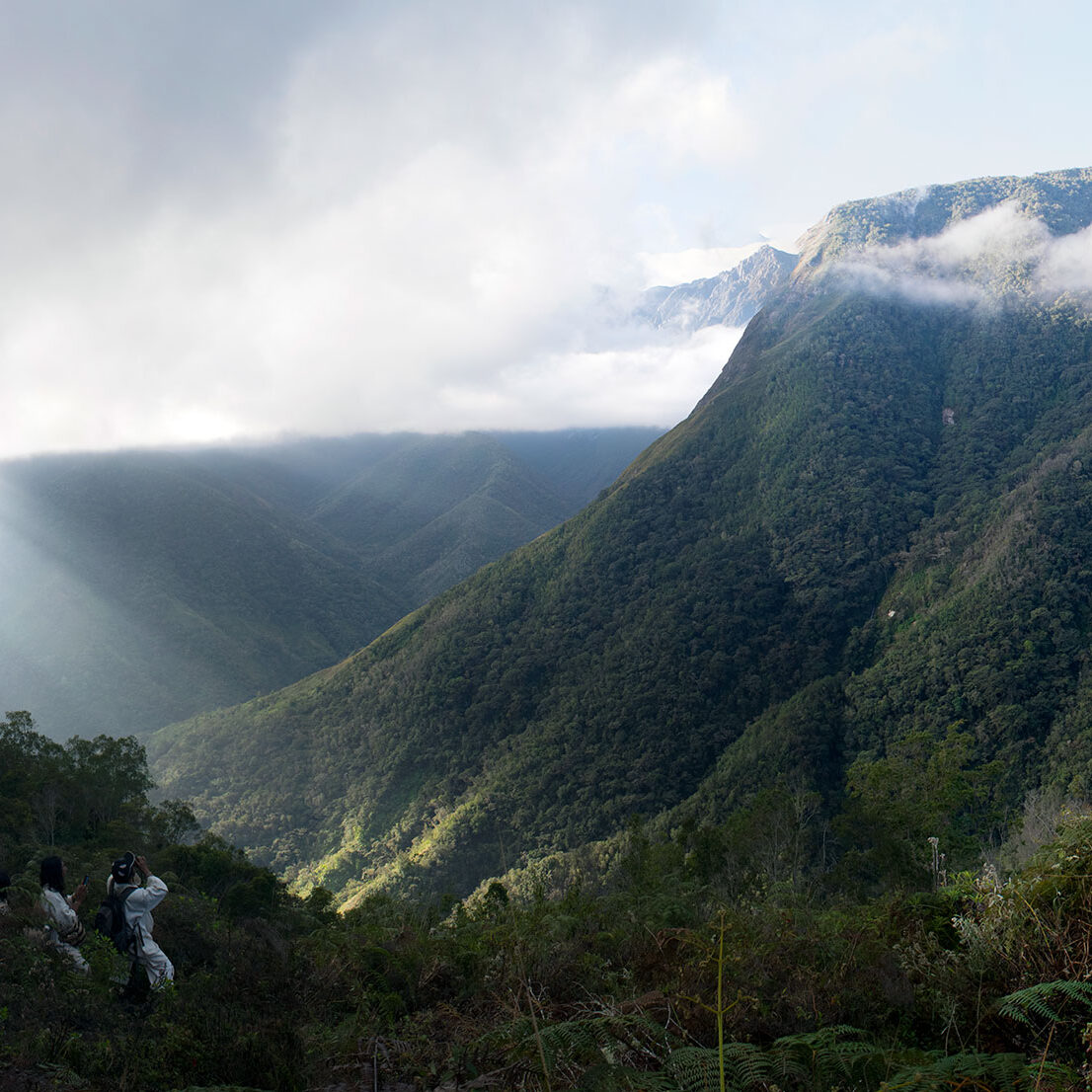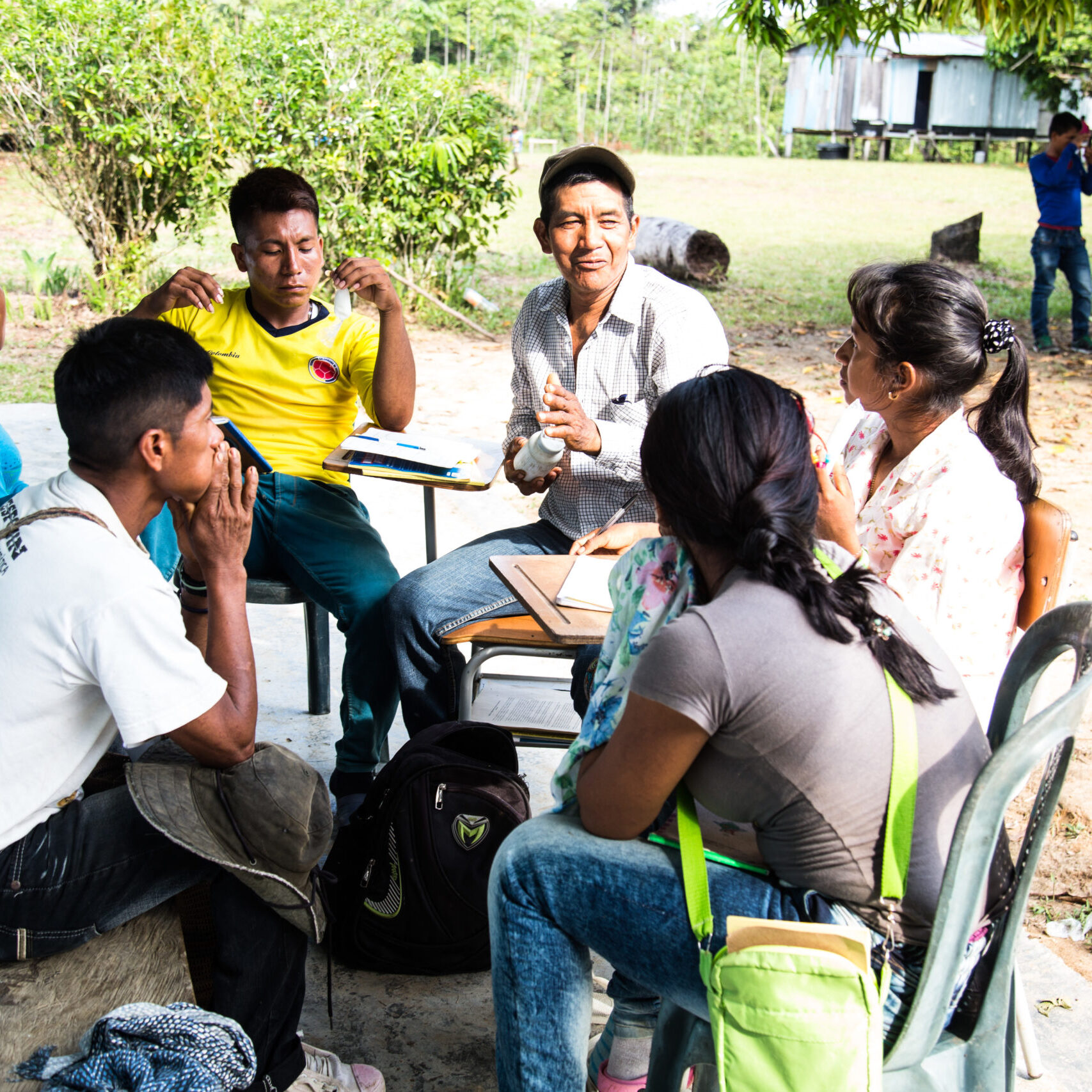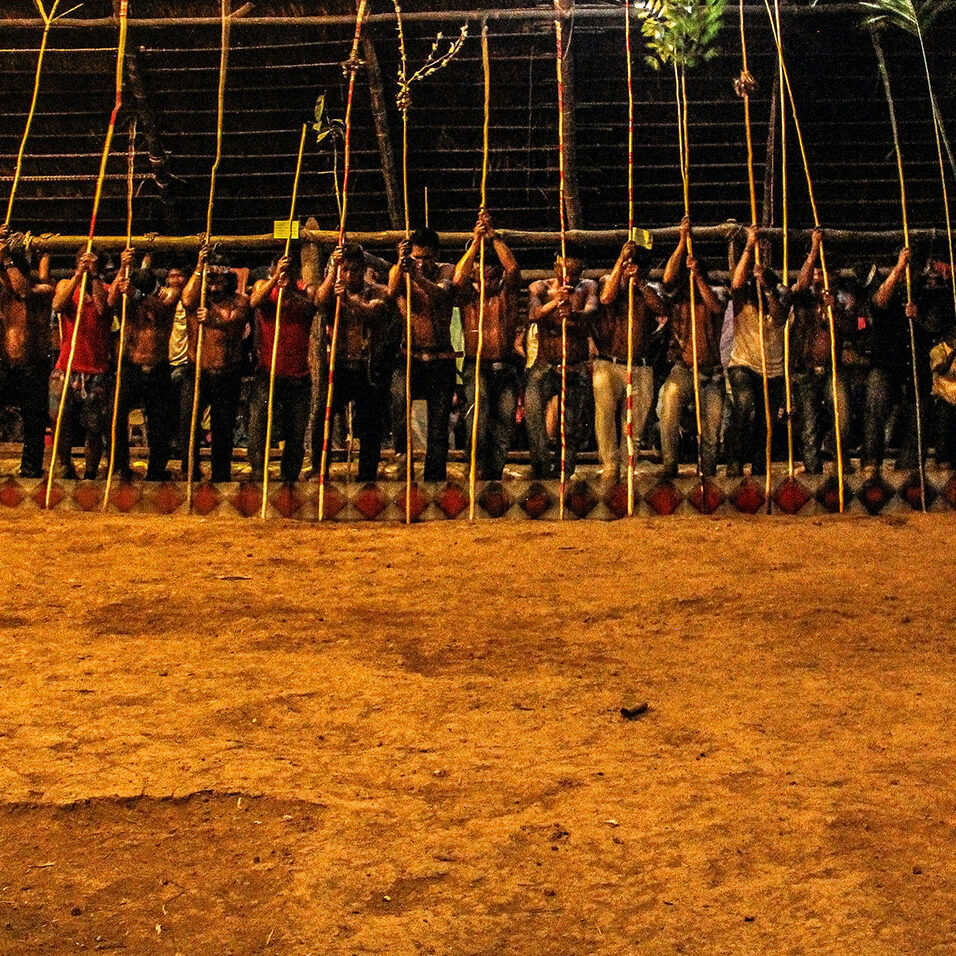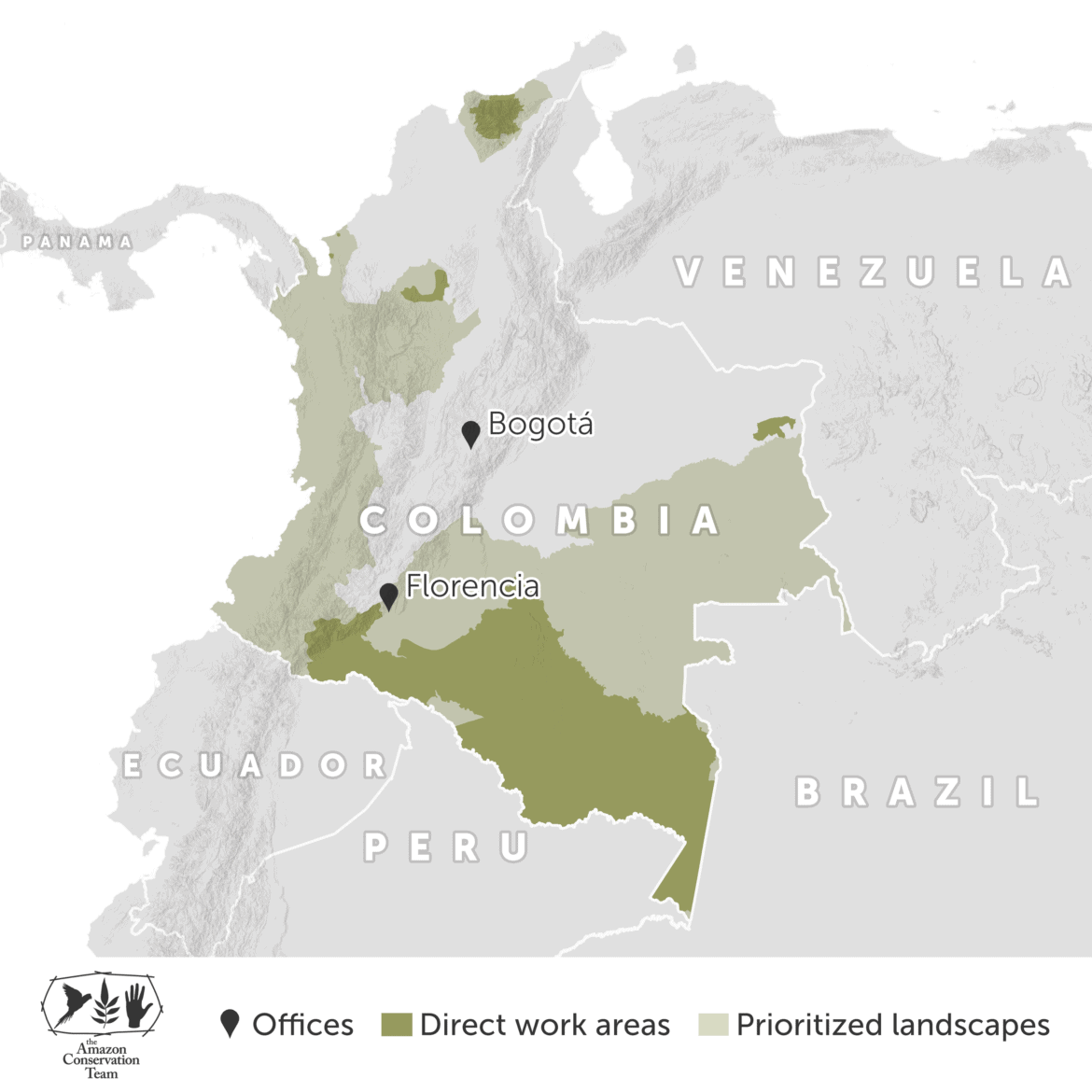Colombia is home to 115 distinct indigenous ethnic groups, campesino communities, and Afro-descendant peoples. We are proud to collaborate with many of these communities to co-create and achieve rights-based, biocultural conservation goals. And they have much to protect. Calculated by number of species, nationally, Colombia holds the second highest biodiversity in the world, containing more than 300 types of ecosystems.
Central to our work in Colombia is the legal recognition of the living ancestral territories of indigenous peoples. We work in direct partnership with many of these communities to protect the health of their forest, the well-being and livelihoods of their populations, and their self-determination and living cultural heritage – which we hold to be intrinsically connected to their ancestral territory and collective future.
LAND:
Protecting biodiversity, tropical forests, and ancestral territory.

Land rights: In Colombia, alongside our indigenous partners, we are most proud of our role in legally establishing and expanding indigenous reserves – a communal land designation protected in perpetuity. Not only do these land designations protect ancestral territory and indigenous lifeways, but they also are critical to maintaining landscape connectivity and protecting biodiversity. For the National Land Agency of Colombia to approve the creation and expansion of indigenous reserves, indigenous groups must complete a myriad of technical, legal, and bureaucratic requirements, which can be costly and time-consuming. To support our indigenous partners in this endeavor, when requested, we facilitate this entire process from start to finish. We work hand-in-hand with communities to fulfill technical, logistic, and legal requests to complete the necessary maps, censuses, historical justifications, and environmental reports for the National Land Agency.
Community Environmental monitoring and management: We support and train community members who carry out environmental monitoring in their indigenous reserves and in co-managed protected areas, such as certain national parks. With partnering indigenous reserves, we facilitate the creation and execution of environmental management plans, tailored to the unique ecological and cultural context of each reserve. As a result, and with advanced tools and satellite imagery, community monitors are better able to track biodiversity and environmental pressures. This data helps our partner communities act quickly in the face of crises such as incursions by illegal miners, and informs internal decisions on territorial management.
Agroforestry and restoration: In some areas of Colombia, rainforest is being rapidly deforested for the purposes of environmentally unsustainable ranching and industrial monoculture production. To regenerate these landscapes and prevent further deforestation from such activity, we promote the use of agroforestry and silvopasture systems. These now widespread alternatives to convention agriculture originated from traditional indigenous production systems. Positive impacts from these systems include increased and diversified family incomes, improved food security, increased resilience to climate change, bolstered biodiversity, and renewed landscape connectivity. To attain these impacts, we provide training, continued technical assistance, and necessary equipment and inputs, while promoting net-zero voluntary deforestation agreements with local smallholder farmers, primarily in the department of Caquetá.
LIVELIHOODS:
Improving physical health, food sovereignty, basic community infrastructure, and economic security to ensure collective well-being.

Intercultural health: Conventional, Western healthcare systems have historically not been able to serve the unique needs of many indigenous populations. The imposition of strictly Western healthcare generally has a lower chance of acceptance, and often threatens to further cultural erasure of indigenous health ways. We support communities in the departments of Putumayo and Amazonas in their efforts to reduce healthcare inequities and medical neglect by expanding and integrating Western healthcare with local indigenous practices.
Solar energy: Without access to reliable forms of clean energy, many communities in the remote Amazon must rely on gas-powered generators, which negatively impact human health and local environments, and demand unreliable and expensive fuel deliveries. We facilitate the installation of sustainable solar energy systems and train community members in their use and maintenance.
Sustainable incomes: The production and sale of environmentally sustainable NTFPs (non-forest timber products) can generate income to improve the economic security of indigenous and campesino communities in remote regions of Colombia. These projects are critical for communities whose members might otherwise have to seek work in destructive or illicit industries to make a living and take care of their families. In response to this dynamic, we promote a variety of income-generating projects as alternatives to coca production, unsustainable agriculture production, and timber sales. One of our more successful projects is the harvesting of cacay nuts from the native castaño de monte tree, integrated into agroforestry systems.
GOVERNANCE:
Supporting self-determination, human rights, and cultural revitalization.

Indigenous leadership and self-determination: We work to uplift indigenous leadership and increase the participation and representation of indigenous peoples in local and national decision-making spaces with regard to their health, livelihoods, and territorial protections. We also seek to improve access of the indigenous peoples in Colombia to their legal guarantees, protections, and rights through a partnership with the Constitutional Court.
Isolated peoples: Indigenous peoples in voluntary isolation, oftentimes referred to as isolated peoples, live with little to no contact with peoples outside their community, living primarily on the natural resources of the rainforest. Their isolation is thought to be an act of self-protection and intentional resistance to violent colonization. We are directly engaged in isolated peoples protection, research, and education projects in Colombia, as well as in Peru, Brazil, and Suriname. We are proud to have worked alongside the national indigenous association OPIAC and a coalition of other indigenous organizations in Colombia to help pass a national decree in 2018 that rules that isolated peoples and their territories must be protected.
We also help create and expand protected areas for isolated peoples, and equip nearby indigenous communities with the training and tools to monitor for threats to their isolated neighbors. Additionally, through satellite imagery and overflights, we substantiate the presence of previously unknown isolated peoples and facilitate the reporting of threats against them to local enforcement agencies and the government. We were honored to have been selected to serv as the Secretariat of the International Working Group on Indigenous Peoples in Isolation and Initial Contact (GTI-PIACI) for the 2024-2026 period.
Cultural revitalization, intercultural education, and youth: In the wake of settler colonialism, missionaries, and corporate globalization, the cultural traditions, knowledge, and languages of many indigenous peoples were intentionally destroyed or made less prominent in their societies. We partner with indigenous communities in Colombia in their efforts to preserve, revitalize, and strengthen living indigenous cultural heritage, carried out through the promotion of cultural and spiritual gatherings of partnering communities. We also carry out this initiative through our children and youth projects, which takes the form of intercultural school networks and environmental education activities for children.
This initiative is embedded into core elements of our work, including the creation of environmental management plans, maps of community knowledge, and intercultural healthcare plans. The indigenous communities that these tools serve are fully involved in their co-creation. We also ensure that these communities have the space to infuse their specific cosmologies, traditional practices, and cultural knowledge into their tools.
To view ACT-Colombia's Código de Ética, click here: Código de Ética
ACTCOL_FORMULARIO DE INTEGRIDAD DE AMAZON CONSERVATION TEAM®


